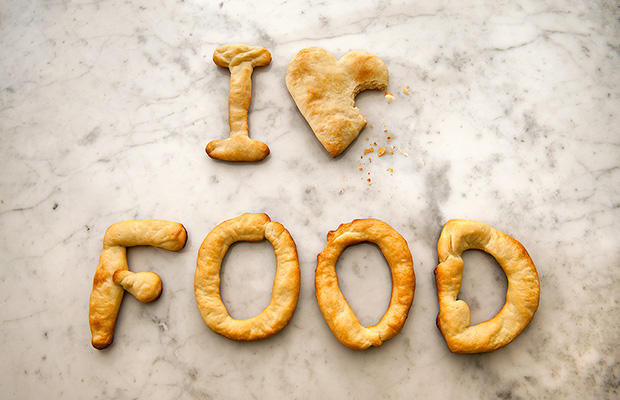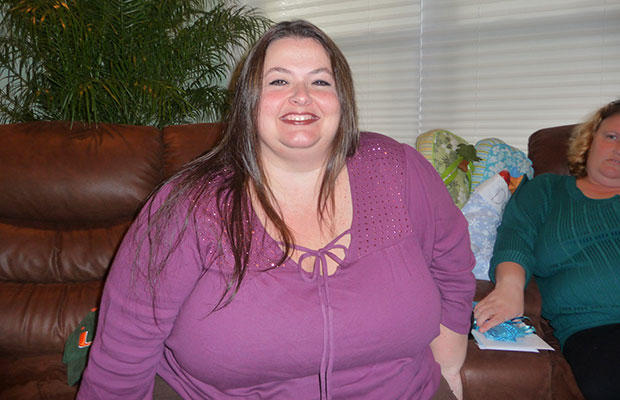"I'm working harder than you think."
"The biggest misconception is that we just don't care, and if we were really trying to lose weight, we would," says Camille, 40, who says she's about 50 pounds over her ideal weight. "People underestimate how much we're thinking about it, watching what we eat, and trying to be active. It's on my mind all the time."
"Food is my drug."
 Photograph by Patrizia Savarese/Getty Images
Photograph by Patrizia Savarese/Getty Images
"Overeating is far more like an addiction than it is a lack of knowledge or willpower," says metabolic and weight management specialist Tom Rifai, MD, a clinical assistant professor of medicine at Wayne State University School of Medicine. Many obese people can't control their eating—at least not on their own. That's because food really can be addictive; many processed foods trigger the same reward mechanisms in the brain that drugs or alcohol do.
Breaking a food addiction is especially difficult because it's impossible to completely abstain from eating, says Rifai. "I've worked with several recovering alcoholic and drug addicts, and all of them say that managing their food intake is way more difficult."
"Being heavy can be painful—but so can being thin."
Kaye, 40, says her weight has fluctuated from 150 to 240 pounds, and for her it's been both an emotional and physical struggle. "When I'm thin, I feel better physically, but out of control emotionally," she says. She's currently about 80 pounds over her ideal weight and says she aches all over, especially in her legs, back, and shoulders. "But eating is what makes my brain feel good. I wish I could put my fat brain in a thin body."
"Stop saying I have a beautiful face."
 Photograph by Tripod/Getty Images
Photograph by Tripod/Getty Images
"Every time someone says it, I hear, 'Given you are so fat, it is surprising you have such a pretty face,' " says Alison, 47, who is 100 pounds over her goal weight. Try complimenting her skill set or accomplishments instead.
"Don't complain to me about your own weight or dress size."
Maybe it's your way of saying you can relate. Or maybe fat talk is so ingrained in our culture that you can't help but scrutinize your thighs in the dressing room mirror. Either way, don' t do it. "I find it very insulting when thin friends complain about their weight or make comments about how they're getting 'fat,' " says Kaye. Alison agrees: "I don't want to hear how fat you think you are when you're 30 pounds less than my ultimate dream weight."
MORE: Your Simple 3-Day Diet Detox
"I'm very active."
 Photograph by darkbird77/Getty Images
Photograph by darkbird77/Getty Images
You can't tell how often someone laces up her sneakers just by looking at her. "I've done three marathons and over a dozen half-marathons," says Alison. Marianne, 44, is 5'4" and 220 pounds, but she moves around a lot thanks to her job teaching horseback riding. "The other day, someone actually said that I couldn't run, but you have to run pretty fast to encourage a horse to canter," says Marianne. "She almost fell over with surprise when I took off." Camille does cardio and weight training regularly. Mary Beth Palmer-Gierlinger, founder of Inspire Health Coaching in New York, isn't surprised. "Many people who are overweight are exercising more than slender people," she says. "They're desperate not to be living in that body."
"I've tried starving myself, and it doesn't work."
Most people who are very overweight have, at some point, tried to majorly cut calories—and failed, says Scott Isaacs, MD, a clinical instructor of medicine at Emory University School of Medicine and medical director at Atlanta Endocrine Associates. While it's true that they're probably eating too much, they're doing so because they're hungry, he explains. "Telling someone to eat less is a lot like telling them to breathe less," he explains. "They can do it for a while, but eventually biology is going to win out."
"I don't need your 'helpful' advice."
"When you remind someone that they said they were on a diet or ask if a food is 'allowed,' you are usually not helping—regardless of the tone of voice you use," says Karen Collins, RDN, a nutritionist and advisor to the American Institute for Cancer Research. "Many, many clients I've worked with over the years note that following such exchanges, they switch into 'rebel' mode and then proceed to eat through a whole box of cookies or a dozen doughnuts." Unless a friend has specifically asked you to help her stay on track, quit playing food police.
That rule goes double for moms who feel it's their duty to inform their daughters that they're getting fat. "Most overweight people know they're overweight," says Camille. "The more people suggest that I lose weight or try to 'helpfully' point out that I've put on some pounds, the more I want to eat."
"Don't sabotage my efforts."
While nagging is a no-no, support—when it's requested—is crucial. "Some clients get stuck in an unhealthy way of eating because their families get upset when they decide to make changes," says Palmer-Gierlinger. Don't throw a fit because your wife wants to toss the ice cream or wave your cheese fries in front of your coworker who just ordered a salad. "Science shows that environment matters," adds Rifai.
MORE: 6 Simple Moves To Ease Sciatica
"I'm not necessarily unhealthy."
It's true that obesity has been linked to a host of medical problems, such as heart disease, diabetes, and even cancer. But not everyone who's carrying around excess weight is in grave danger. "I may be technically obese, but I go to the doctor regularly and my cholesterol and blood pressure are always excellent," says Camille.
Katherine, 30, who weighs 200 pounds, says she rarely gets sick anymore. "When I was younger, I was skinny, but I ate horribly—think French fries, ramen noodles, and ice cream nearly daily—and I did not exercise often. I was also sick all the time," she says. "These days I eat a really veggie-heavy diet and walk or bike almost everywhere that I go."
"Don't assume I'm trying to lose weight."
While many overweight people wish they were thinner, some are conflicted or even opposed to slimming down. Toby Smithson, RDN, a nutritionist and spokesperson for the Academy of Nutrition and Dietetics, says that she's counseled women who intentionally overate because they felt excess pounds would protect them from unwanted advances. "Everyone flirts with you when you're thin, and I don't like people in my personal space," says Marianne. "I suppose that, in a way, being fat is easier than wanting to scream 'get the f*** away from me' half the time."
Others believe that weight really is just a number, and there's no reason at all to focus on it. "There is no right or wrong weight," says Amy Pence-Brown, 40, a body positive activist in Boise, ID. "All bodies are good bodies, and you cannot tell someone's health just by looking at them."




